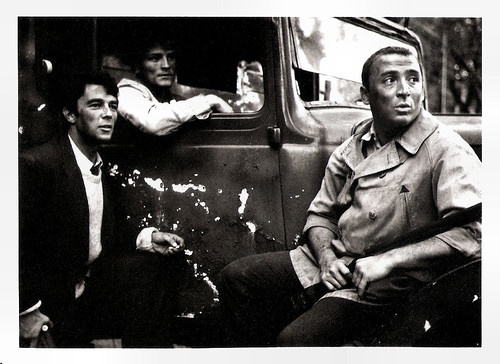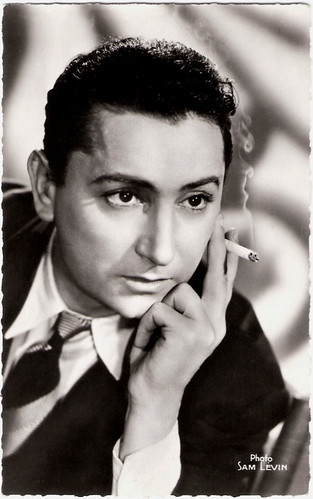
French postcard by La Roue Tourne, Paris / Imp. Rivier, no. 961-14-01.

French postcard by Edition Librairie de la Fontaine, Paris, no. 141 (limited edition of 250 ex.). Photo: Claude Schwartz / Spadem. Gérard Blain, Jacques Perrin and Claude Brasseur in Un homme de trop/Shock Troops (Costa-Gravas, 1966).
"You cannot remain a journalist with a name like that"
Claude Brasseur born as Claude Pierre Espinasse, in Neuilly-sur-Seine, France, in 1936. He was the son of the film actors Pierre Brasseur and Odette Joyeux.
Claude grew up surrounded by French celebrities, Malraux, Jouvet, Sartre, Casarès. His godfather was Ernest Hemingway, who was a friend of his father. His childhood was a painful memory: his parents did never take care of him. His egocentric parents separated very quickly. Odette Joyeux retained such bad memories of Pierre Brasseur that she resented her son for adopting his pseudonym, Brasseur.
Jean-Luc Douin in Le Monde: "'Brasseur Father and Son, House founded in 1820': the subtitle of the memoirs 'Merci !, Flammarion', he published in 2014, underlines the importance in his eyes of having belonged to a dynasty. His real name Claude Espinasse, the man who became popular by playing Vidocq for television in the early 1970s will therefore have inherited a family pseudonym."
The first Brasseur was Jules Dumont, a clerk who converted to the stage, comic actor, and founder of the Théâtre des Nouvelles. His son Albert became a star of the Théâtre du Palais-Royal. he was the father of Pierre Brasseur, the unforgettable seducer of Arletty in Marcel Carné's classic film Les Enfants du Paradis/Children of Paradise (1945).
In boarding school, Claude Brasseur met Philippe Noiret, the future actor, and Jacques Mesrine, the future gangster. He did not focus on his studies and the boy didn't dare to admit that he wanted to be an actor. His father helped him to become a journalist at Paris Match and an assistant to photographer Walter Carone.
During an interview with actress Elvire Popesco, his destiny changes. Popescu told him: "You cannot remain a journalist with a name like that. You have to be an actor!" Popescu had just bought the Théâtre de Paris and offered him a contract. In 1955, he appeared in three small roles in Marcel Pagnol's 'Judas' that Popesco staged. After that, Brasseur entered the Conservatory and started to play in the cinema. In 1959, he was the son of Jean Gabin and a track cyclist in Rue des prairies/Rue de Paris (Denys de La Patellière, 1959).

Albert Brasseur. French postcard in the first series of the Collection Paris qui chante by J.R., Paris, no. 9. Photo: publicity still for the original stage production of the operetta Sire de Vergy (1903) with Albert Brasseur as Sire de Coucy.

Pierre Brasseur. French postcard by Editions du Globe, no. 125. Photo: Sam Lévin.
Acting opposite his real and fictitious father
Claude and Pierre Brasseur met on the set of the horror film Les Yeux sans visage/Eyes Without a Face (Georges Franju, 1960) and again on the set of the crime film Lucky Jo (Michel Deville,1964) with Eddie Constantine, in which the real father played a fictitious father. Although the two men failed each other on an emotional level, Claude respected the career of his father.
Claude played a big role in the comedy Le Caporal épinglé/The Elusive Corporal (Jean Renoir, 1962), starring Jean-Pierre Cassel. One of his first well-known film roles was as Arthur in the Nouvelle Vague classic Bande à part (Jean-Luc Godard, 1964) with Anna Karina and Sami Frey.
His other films included the French-Italian drama Un homme de trop/Shock Troops (Costa-Gavras, 1967) with Charles Vanel, Une belle fille comme moi/A Gorgeous Kid Like Me (François Truffaut, 1972), starring Bernadette Lafont, and the romantic thriller Barocco (André Téchiné, 1976), starring Isabelle Adjani and Gérard Depardieu.
Claude Brasseur played the title role in the popular historical crime series Les nouvelles aventures de Vidocq/The New Adventures of Vidocq (1971-1973). Brasseur starred as Eugène François Vidocq, an early nineteenth-century criminal turned crime-fighter.
He co-starred with Jean Rochefort and Guy Bedos in the comedy Un éléphant ça trompe énormément/Pardon Mon Affaire (Yves Robert, 1976), later remade in Hollywood as The Woman in Red (1984). For his role he won a César Award - the French Oscar. Brasseur won another César for his leading role in the police drama La guerre des polices/The Police War (Robin Davis, 1980) with Claude Rich and Marlène Jobert.
Big international box-office hits were the comedies La Boum/The Party (Claude Pinoteau, 1980) and La Boum 2/The Party 2 (Claude Pinoteau, 1982), in which he played the father of Sophie Marceau's teenage character. Brasseur was a regular participant as co-driver in the Paris-Dakar Rally. He won the Paris-Dakar Rally in 1983 as co-driver of Jacky Ickx.
On-screen, he reunited with Godard for the crime film Détective (Jean-Luc Godard, 1985) with Nathalie Baye and Johnny Hallyday. His final film was the comedy Tout le monde debout/Rolling to You (Franck Dubosc, 2018).
Claude Brasseur died on 22 December 2020. He was not a Covid victim. He will be buried in Paris in accordance with sanitary rules and will rest alongside his father in the Père-Lachaise cemetery in Paris. He was married to Peggy Roche and Michèle Cambon. He was the father of Alexandre Brasseur, with whom he appeared on stage in 2007 in 'My father was right', by Sacha Guitry.

Small Belgian collectors card by Uitg. Best, Antwerp, for Victoria, Brussels, no. 493, Album 3.

French collectors card in the 'Portrait des Stars: L'encyclopédie du Cinéma' by Edito-Service, 1991, no. D2 482 01-20. Photo: Studio Harcourt.
Sources: Jean-Luc Douin (Le Monde - French), Wikipedia, and IMDb.
No comments:
Post a Comment